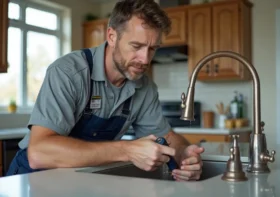The Real Impact of Hard Water on Kitchens and Bathrooms

Hard water is much more than an inconvenience. It can severely impact the functionality and aesthetics of homes, particularly in kitchens and bathrooms. Understanding how this issue manifests and what can be done about it is crucial for homeowners who value their living spaces. Hard water contains high levels of dissolved minerals, specifically calcium and magnesium, which can lead to a range of problems.
These issues affect appliance efficiency and have implications for health and hygiene by encouraging mold and bacteria growth. Further exploring this often-overlooked topic reveals the intricate ways hard water influences our day-to-day lives.
Contents
What Is Hard Water?
Hard water is defined by the presence of high mineral content, particularly calcium and magnesium. These minerals come primarily from the groundwater sources that supply municipal water systems or private wells. The hardness of water is classified as either moderately hard, hard, or very hard, with each category indicating an increasing concentration of these minerals.
Moderately hard water contains between 61 and 120 milligrams per liter of calcium carbonate, whereas very hard water exceeds 180 milligrams per liter. This mineral buildup can be particularly problematic in kitchens and bathrooms.
Identifying the Symptoms of Hard Water
Several signs indicate the presence of hard water in a home. One prominent symptom is the appearance of scale buildup on faucets and showerheads, which creates unsightly deposits and reduces water flow. Homeowners may notice soap scum buildup on sinks and tubs, making cleaning more labor-intensive.
Hard water can lead to dull hair and dry skin, as the minerals can strip moisture away. Those who frequently wash dishes may find that soap is less effective, leading to more effort to achieve clean dishes. Recognizing these signals early can help homeowners take prompt action to mitigate the damage associated with hard water.
The Damage Caused by Hard Water
The damage from hard water can be extensive, particularly in appliances and plumbing systems. Dishwashers, water heaters, and laundry machines are susceptible to mineral buildup, which can shorten their lifespan significantly. According to the U.S. Geological Survey, an estimated eight out of ten households in the United States have hard water, which leads to an increase in energy costs due to decreased efficiency in appliances.
The cost of repairs and replacements for these appliances can add up, making hard water an inconvenience and a financial burden. Home plumbing may suffer, with potential clogs forming in pipes due to mineral deposits. This can require costly professional intervention to clear blockages and restore proper function.
Hard Water’s Effect on Cleaning
Cleaning can become a frustrating chore when battling hard water. The mineral deposits can interact with cleaning agents, reducing their effectiveness and forcing homeowners to use more soap or detergent to achieve satisfactory results. This is particularly true for bathrooms, where soap scum and scale can accumulate quickly around faucets, tubs, and tiles.
As a result, individuals may often find themselves spending additional time scrubbing and maintaining their sanitary spaces. Staying committed to regular cleaning sessions can be difficult. It’s important to keep spaces looking presentable and hygienic. Developing a strategy that involves preventative measures can ease some of these burdens.
Counteracting Hard Water with Filtration
One of the most effective ways to deal with hard water is by installing a filtration or softening system at home. These solutions address many of the common issues caused by mineral buildup, from extending the lifespan of appliances to improving cleaning results and enhancing water quality.
With a wide range of options available, it’s easier than ever for homeowners to find an approach that fits their needs and budget. Exploring hard water solutions for your home is an excellent starting point to determine which system or product will work most effectively. Softening the water reduces scale and buildup and improves its taste, smell, and the experience of everyday use.
Long-Term Health Impacts of Hard Water
Though hard water is generally considered safe to drink, prolonged exposure can have health implications that are worth considering. The presence of excess minerals can contribute to skin irritations or conditions such as eczema in sensitive individuals. Often, these individuals may find that switching to treated water improves the condition of their skin.
Hard water has been implicated in the formation of kidney stones due to the buildup of calcium and other minerals in the body. Being proactive about understanding the water in your home can be a key component of leading a healthier lifestyle. Balancing aesthetics with health can encourage a deeper engagement with the quality of water one consumes.
Seeking Professional Help
For homeowners struggling with hard water, seeking advice from professionals can be advantageous. Local experts can provide insights and recommendations tailored to specific water quality challenges. This personalized approach educates homeowners on the pros and cons of various systems, and it creates peace of mind knowing that installations meet safety and efficiency standards.
Consulting a specialist in water conditioning and filtration allows for a thorough assessment of the household’s water quality, drawing up potential solutions that effectively address individual needs.
Environmental Impact of Hard Water
Beyond its effects on households, hard water has environmental consequences that are often overlooked. Excessive use of detergents, soaps, and cleaning products required to combat hard water buildup increases chemical runoff into local waterways. This can negatively affect aquatic ecosystems and contribute to water pollution.
The reduced efficiency of appliances such as water heaters and washing machines leads to higher energy consumption, indirectly raising a household’s carbon footprint. By addressing hard water with efficient filtration or softening systems, homeowners improve their living spaces and reduce unnecessary waste and energy use, making their homes more environmentally sustainable.
Understanding hard water and its repercussions is crucial for maintaining a healthy and functional home environment. From its impacts on cleaning and appliance efficiency to its long-term effects on health, the consequences of hard water cannot be overstated.
By considering filtration and softening options, homeowners can significantly enhance their quality of life. Addressing these issues early on will pave the way for a more enjoyable experience in kitchens and bathrooms, creating a better home living experience.



